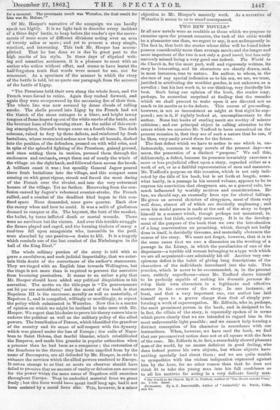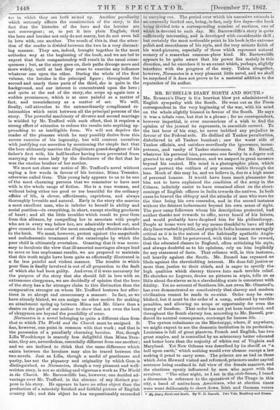TWO NEW NOVELS.*
IF all new novels were as readable as those which we propose to examine upon the present occasion, the task of the critic would be a pleasanter one than, we regret to say, it not unfrequently is. The fact is, that both the stories whose titles will be found below possess considerablymore than average merit; and the longer and more important of the two is not only a good novel, but has ouly narrowly missed being a very good one indeed. The World is the Church is, for the most part, well and vigorously written, its story is interesting, and its characters are clearly drawn, and, in most instanees, true to nature. Its author, to whom, in the absence of any special indication as to his sex, we are, we trust, justified in attributing the worthier gender, is not unknown as is novelist ; but his last work is, to our thinking, very decidedly hie. best. Such being our opinion of the book, the reader may, perhaps, be somewhat surprised at finding that the remarks which we shall proceed to make upon it are directed not no much to ita merits as to its defects. This course of proceeding, however, is not so inconsistent as might at first sight be sup- posed ; nor is it, if rightly looked at, uncomplimentary to the author. None but books of sterling merit are worthy of minute- criticism ; and our principal object in calling attention to the errors which we conceive Mr. Trafford to have committed on the present occasion is, that they are of such a nature that he can, U- be likes, very easily avoid them for the future.
The first defect which we have to notice is one which is, un- fortunately, common to many novels of the present day—we mean, the possession of a distinct "purpose." We call this, deliberately, a defect, because its presence invariably exercises a more or less prejudicial effect upon a story, regarded either as a work of art, or as a faithful representation of men and manners. Mr. Trafford's purpose on this occasion, which is not only indi- cated by the title of his book, but is set forth at length, some- what hazily, in a passage in his second volume, appears to be to. express his conviction that clergymen are, as a general rule, too much influenced by worldly motives and considerations. He has, we should say, an unusually keen eye for clerical failings. He gives 1113 several sketches of clergymen, most of them very well done, almost all of whieh are decidedly unpleasing ; and. even his model parson is made at the end of the story to forget himself in a manner which, though perhaps not unnatural, is, we cannot but think, scarcely necessary. It is to the develop- ment of the purpose of the book that we owe the introduction of a long conversation on preaching, which, though not badly done in itself, is decidedly tiresome, and materially obstructs the course of the story. We must not forget, however, that it is to- the same cause that we owe a discussion on the wording of a passage in the Litany, in which the peculiarities of one of the disputants—a terrible old woman belonging to a type with which we are all acquainted—are admirably hit off Another very con- spicuous defect is the habit of giving . long descriptions of the- characters of the individuals introduced into the tale. This practice, which is never to be recommended, is, in the present case, entirely superfluous—since Mr. Trafford shows himself to be perfectly capable of making his dramatis personm de- velop their own characters in a legitimate and effective manner in the course of the story. In one instance, at least, and that a very important one, our author has laid himself open to a graver charge than that of simply per- forming a work of supererogation. Mr. Edfords, who is, perhaps, the most prominent person in the book, and is designed to be, in fact, the villain of the story, is repeatedly spoken of in terms which prove clearly that we are intended to regard him in the most unfavourable light possible; and we cannot help forming a distinct conception of his character in accordance with our instructions. When, however, we have read the book, we find that our preconceived notion does not at all square with the facts of the case. Mr. Edfords is, in feet, a remarkably shrewd pleasant man of the world, by no means deficient in good feeling, who does indeed pursue his own objects, but whose objects have nothing specially bad about them; and we are quite unable to sympathize with the violent indignation expressed against him by the hero, for no other reason than that he does not think fit to take the young man into his full confidence as to all his motives for acting in a very delicate family mat- . The World Si the Mirth. By F. G. 'Trafford, Author of "Tho Moore and the Fens,', ac 5 Tole. Skeet. Normanton. By A. J. Berrowellffe, Author of AmberMil," As. Smith, Elder, end Co. ter in which they are both mixed up. Another peculiarity which seriously affects the construction of the story, is the fact that the histories of the hero and the heroine are not convergent; or, to put it into plain English, that the hero and heroine not only do not marry, but do not even fall in love with, one another. The result of this is, that the atten- tion of the reader is divided between the two in a very distract- ing manner. They are, indeed, brought together in the most orthodox way at the beginning of the book, and we are led to expect that their companionship will result in the usual conse- quences; but, as the story goes on, their paths diverge more and more widely, until at last they cease to exercise any influence whatever one upon the other. During the whole of the first volume, the heroine is the principal figure ; throughout the second and nearly three parts of the third, she is quite in the background, and our interest is concentrated upon the hero ; and quite at the end of the story, she crops up again into a sudden prominence, which is at once painful as a matter of fact, and unsatisfactory as a matter of art. We will, finally, call attention to the extraordinarily complicated re- lationships which exist between all the principal persons of the story. The powerful machinery of divorce and second marriage is wielded by Mr. Trafford with such effect, that it requires a strong effort of attention to reduce the results into anything ap- proaching to en intelligible form. We will not deprive the reader of the pleasure which he may possibly derive from this severe exercise of his ingenuity, but will content ourselves with justifying our assertion by mentioning the simple fact that the hero ultimately marries the illegitimate grand-daughter of his father's first wife, his half-brother having been prevented from marrying the same lady by the disclosure of the fact that he was the uterine brother of her moiler.
We must not close our notice of Mr. Trafford's novel without saying a few words in favour of his heroine, Mime Trennier, otherwise called Gem. This young lady appears to us to be one of the most charming persons that we remember to have met with in the whole range of fiction. She is a true woman, and without being either too good or too beautiful for the ordinary affairs of life, is clever, affectionate, capricious, and always thoroughly loveable and natural. Early in the story she marries a most excellent man, who is inferior to herself in ability and social position—in everything, in short, except sterling goodness of heart ; and all the little troubles which result to poor Gem from this alliance, by compelling her to associate with •people who are in every way below her, are admirably worked out, and give occasion for some of the most amusing and effective sketches in the book. We must, however, protest against the magnitude and melodramatic treatment of the catastrophe by which the poor child is ultimately overtaken. Granting that it was neces- sary to inculcate the view that ill-assorted marriages always lead to more or less unpleasant results, we are prepared to maintain that this truth might have been quite as effectually illustrated in a far less painful and violent manner. The trouble in which poor Gem is finally involved is out of all proportion to the fault of which she had been guilty. And even if it were necessary for the purpose of the story that she should fall in love with an extraneous clergyman, we are decidedly of opinion that the hero of the story has a far stronger claim to this distinction than the comparative stranger on whom Mr. Trafford bestows her affec- tions in so abrupt and unnecessary a manner. In fact, as we have already hinted, we can assign no other motive for making an attachment spring up between Minn and Mr. Glave than a desire on the part of our author to show that not even the best of clergymen are beyond the possibility of error.
Normanton is a novel belonging to quite a different class from that to which The World and the Church must be assigned. It has, however, one point in common with that work ; and that is the possession of a peculiarly charming heroine. But, though Lille Woodthorpe is scarcely less delightful than Mime Town- suer, they are, nevertheless, essentially different from one another; and we are inclined to think that the same difference which exists between the heroines may also be traced between the two novels. Just as Lila, though a model of gentleness and purity, has not the piquancy and originality by which Gem is distinguished, so Nortnanton, though a very pleasant and well- written story, is not HO striking and vigorous a work as The World in the Church. Mr. Barrowcliffe has, however, one decided ad- vantage over Mr. Trafford, in the absence of any distinct pur- pose in his story. He appears to have no other object than the production of a minutely finished and faithful picture of English country life ; and this object he has unquestionably succeeded
in carry log out. The period over which his narrative extends is an unusually limited one, being, in fact, only five days—the book being divided into a corresponding number of sections, one of which is devoted to each day. Mr. Barroweliffe's story is quite sufficiently interesting, and is developed with considerable skill ; but certainly the most noticeable point in his book is the extreme polish and smoothness of his style, and the very minute finish of his word-pictures, especially of those which represent natural scenery of a somewhat common-place kind. Mr. Barrowoliffe appears to be quite aware that his power lies mainly in this direction, and he exercises it to an extent which, perhaps, slightly interferes with the progress of the story. Taken altogether, however, Normanton is a very pleasant little novel, and we shall be surprised if it does not prove to be a material addition to the reputation of its author.































 Previous page
Previous page